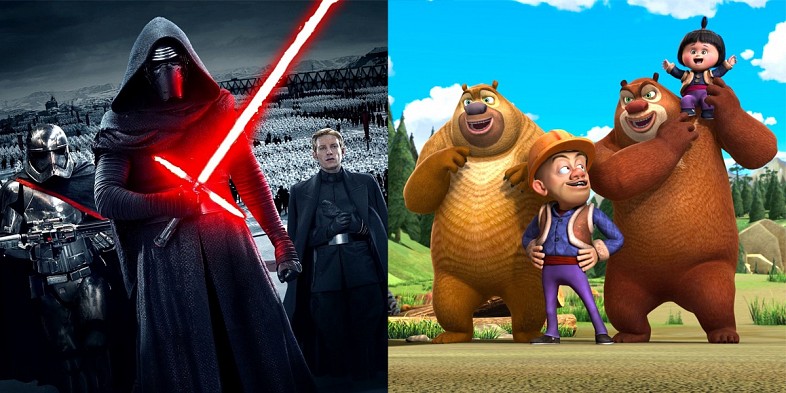
Star Wars 7 Beat in China by Low-Budget Cartoon Bears
China is rapidly becoming the largest market in the world for Hollywood movies, and figuring out how to appeal to the sensibilities of an audience whose tastes, sensitivities, and cultural histories often differ wildly from those in the West, has proved a challenge for many Hollywood studios. Disney and Lucasfilm, in particular, knew that they were facing an uphill battle in selling Star Wars 7: The Force Awakens to Chinese audiences, who have proven to enjoy American action films but do not generally share the powerful nostalgia for the Star Wars franchise their Western counterparts do. After all, non-local films were not widely shown in China when the original trilogy was first produced, and the country’s now booming theater industry was only just ramping up when the prequels premiered.
Now, though The Force Awakens eventually opened to a respectable (if underwhelming, for Disney) $52 million in Chinese theaters, it dropped a steeper than expected 70% in only its second weekend of release. More surprising than that, though, was the movie that dethroned the international box-office juggernaut: Boonie Bears: The Big Top Secret – a low-budget children’s cartoon.
Though virtually unheard of outside of it’s native country, the Boonie Bears are a multimedia franchise enormously beloved among Chinese children. Similar in setup to classic Western cartoon shorts like Yogi Bear, the series is a slapstick comedy following the adventures of two bears, Briar and Bramble, who scheme to thwart the hapless lumberjack Logger Vick from cutting down trees in their forest.
Debuting in 2012, the locally-produced 3D animated series from Fantawild Animation is the most popular Children’s television program in China, and has already spawned two earlier films, Boonie Bears: To The Rescue and Boonie Bears: Mystical Winter, both of which were similarly huge hits. In anticipation of Big Top Secret’s release, Chinese exhibitors drastically reduced The Force Awakens‘ screen count, which no doubt contributed to the surprising size of the Disney blockbuster’s drop in sales; a drop which will contribute to the film likely not unseating James Cameron’s Avatar as the highest-grossing movie ever worldwide.
Predicting the moviegoing tastes of Chinese moviegoers has been a difficult gambit for many studios, as the nation’s previously strict limitations on imports of Western popular-culture mean that the iconic brands and characters who fuel much of modern Hollywood’s output are unknown quantities to many Chinese audiences. And while films like Transformers: Age of Extinction found success by shooting and setting part of its story in China, that option isn’t available to all properties – and even then, not every filmmaker is going to want to do so in the first place. Meanwhile, other films have an even more difficult time: Deadpool, the highly-anticipated X-Men spinoff from Fox, was recently banned from China due to to its excessive sex and violence.
On the other hand, series like The Fast & The Furious have netted massive returns in China (Furious 7 earned a huge $380 million at Chinese theaters, a record) while other American-produced features like Pacific Rim have been found to be more popular with Chinese audiences than Western ones; a fact which no doubt factored in Chinese theater conglomerate Wanda’s recent purchase of Legendary Pictures.
Time will tell if Star Wars: The Force Awakens can make up any lost ground but, for now, the film has grossed an estimated $97.46 million in China – a success, no doubt, but less than Disney was likely hoping to see the movie make.
Source: Screen rant












